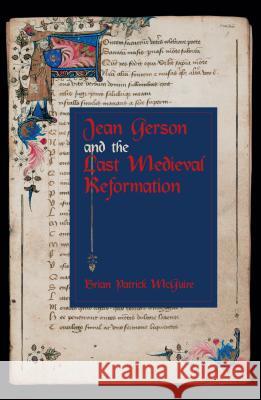Jean Gerson and the Last Medieval Reformation » książka
Jean Gerson and the Last Medieval Reformation
ISBN-13: 9780271027067 / Angielski / Miękka / 2005 / 441 str.
In this biography of the noted French philosopher and theologian Jean Gerson, the first since 1929, Brian Patrick McGuire presents a compelling portrait of Gerson as a voice of reason and Christian humanism during a time of great intellectual and social tumult in the late Middle Ages. Born to a peasant father and mother in the county of Champagne, Gerson (1363-1429) was the first of twelve children. He overcame his modest beginnings to become a scholastic and vernacular theologian, a university intellectual, and a church reformer. McGuire shows us the turning points in Gerson's life, including his crisis of faith after becoming chancellor of the University of Paris in 1395. Through these key moments, we see the deeper undercurrents of his mystical writings. With their rich display of spiritual and emotional life, these writings were to earn Gerson the appellation "doctor christianissimus." In turn, they would influence many later thinkers, including Nicholas of Cusa, Ignatius of Loyola, Francis de Sales, and even Martin Luther. Gerson is a man perhaps easier to admire than to love: conscientious to a fault, at once a pragmatist and an idealist in church politics, a university intellectual who both fostered and distrusted the religious aspirations of the laity, a powerful prelate who moved among the great yet never forgot his peasant origins, a self-revealing yet intensely private man who yearned for intimacy almost as much as he feared it. McGuire ably situates Gerson in the context of his age, an age replete with doctrinal controversies and the politics of papal schism on the eve of the Protestant Reformation. Gerson emerges as a proponent of dialogue and discussion, committed to reforming the church from within. His courageous effort to renew the unity of a unique civilization bears examination in our own time.











